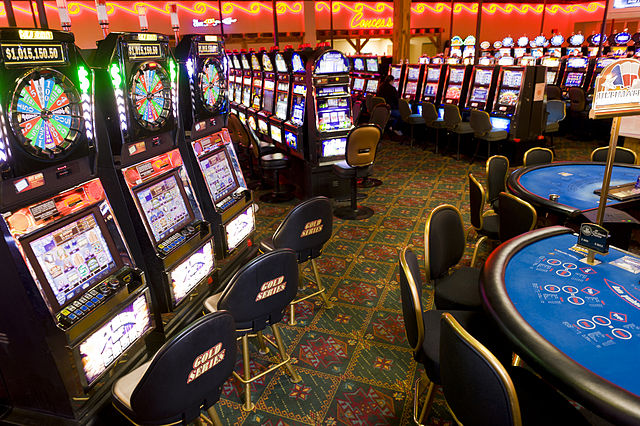
Casino games have long been a fascinating source of amusement, drawing numerous of players from different cultures around the globe. From the lively casinos of Las Vegas to the busy gambling halls of the Chinese gambling capital, these games serve as a link that unites people across a variety of backgrounds. The allure of luck, tactics, and gambling entices not only those looking to win money but also those in search of a sense of community.
The cultural impact of casino games extends well beyond the gaming floor. They often embody the values and traditions of the societies in which they thrive. Games such as poker, blackjack, and the wheel game have woven themselves into the mosaic of mainstream culture, influencing everything from films to clothing. As we explore this intriguing intersection of luck and society, we can better understand how these games shape and are shaped by the world around us.
Chronological Evolution of Gaming Games
The beginnings of casino games can be traced back to ancient civilizations, where gambling in various forms was widely practiced. In Ancient China, around 2300 B.C., a variant of luck game known as Keno was popular, while in old the Roman Empire, soldiers would regularly wager on the consequences of their contests. The concept of using chance for entertainment and profit evolved over the ages, leading to the formation of more formal games. By the final Middle Ages, betting houses began to emerge in the continent, especially in the Italian peninsula, which presented early versions of famous activities still practiced today.
As betting expanded recognition in the continent, the 17th and 18th centuries saw the appearance of gaming houses as exclusive establishments for gaming. The first official gaming venue, the Ridotto, was set up in Venice in sixteen thirty-eight, offering games like the game of Baccarat and the game Faro. This period marked a crucial pivoting point, as gaming venues began to welcome not just the wealthy but also the growing middle-income class. The refinement of games increased, leading to the development of new guidelines and modifications that improved the gaming experience.
In the 19th century, the industrial revolution and shifts in social standards additionally changed the terrain of gaming activities. The arrival of the game of roulette and contemporary one-armed bandits attracted a broader crowd, and gambling establishments became seen as legitimate forms of recreation. This time witnessed the international spread of gambling, as gambling houses spread from European nations to the Americas, culminating in the establishment of the legendary Las Vegas Boulevard in the twentieth century. The development of casino games has persisted into the present day, integrating new technologies and online platforms, allowing them accessible to a worldwide market.
## Cultural Relevance in Different Cultures
Gambling games have significant social importance across numerous communities around the globe. In Las Vegas, the very core of the city is woven around gambling establishments, where gaming is not just a recreational activity but a central aspect of social engagement and community life. The vivid lights and vibrant atmosphere attract a vast audience, showcasing how games of chance can shape local economical structures and local cultures. This environment transforms the notion of leisure into an immersive experience that influences style, music, and even movies.
On the other hand, some cultures treat betting with an air of caution, viewing it through the lens of ethical considerations and heritage. https://alo789gi.com/ For example, in many Oriental communities, games like Mahjong and Pai Gow Gambling are rich with history and have significant social relevance. These games are often played during meetings and festivities, fostering community bonds and solidifying familial ties. The act of engaging in these games goes above mere leisure, reflecting values such as respect for elders and the importance of collective enjoyment.
At the same time, in European countries such as Monaco and Italy, games of chance serve as symbols of opulence and sophistication. The stylish atmosphere of these venues attracts both visitors and locals, reinforcing a sense of distinction and rarity. The art of the game of poker and the tactical components of games like banker’s game are esteemed, molding social dynamics and establishing an attraction that fascinates a heterogeneous audience. This underscores how casino games can concurrently reflect and mold cultural perspectives towards hazard, benefit, and relationship building.
Economic Impact and Tourism
Gambling activities play a significant role in the financial context of many regions, particularly those that depend significantly on visitor traffic. The revenue generated from gambling establishments fuels local financial systems, creating jobs not only within the casinos but also but also in connected industries such as hospitality, restaurant services, and entertainment. This surge of tourists, drawn by the attraction of gambling and the overall casino experience, stimulates spending across multiple businesses, contributing to the economic health of the region.
The presence of casinos often leads to the development of infrastructure, including hotels, public transit, and recreational facilities. These developments are essential in enhancing the overall tourist experience, making locations more appealing to visitors. Additionally, many casinos contribute in local communities through support of events and philanthropic activities, further integrating themselves into the social fabric of the locality. Such investment not only supports economic growth but also fosters a positive image of the casino industry.
Moreover, the worldwide appeal of casino games drives competitive tourism, with regions vying to attract players from around the world. Iconic destinations like Las Vegas and Macau have become synonymous with gambling culture, drawing millions annually. This advantage encourages creativity and diversification within the gambling sector, influencing trends in entertainment and hospitality that extend beyond their limits. The ripple effects of this tourism extend far, impacting local economies and cultural interactions on a global scale.